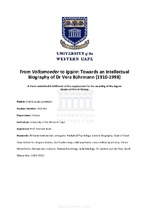| dc.contributor.advisor | Bank, Andrew | |
| dc.contributor.author | Landman, Andre Louis | |
| dc.date.accessioned | 2020-07-02T13:40:05Z | |
| dc.date.available | 2020-07-02T13:40:05Z | |
| dc.date.issued | 2020 | |
| dc.identifier.uri | http://hdl.handle.net/11394/7272 | |
| dc.description | Magister Artium - MA | en_US |
| dc.description.abstract | This biography of Dr Vera Bührmann is an intersectional and interdisciplinary investigation of an unusual Afrikaner woman who occupied several unusual places in South African society. Through rigorous archival research and a wide reading of English and Afrikaans secondary sources, I examine the mythology that has grown up around Dr Bührmann and expose contradictions and inaccuracies inherent within these myths.
I adopt a chronological approach but focus on certain key motifs. I dwell on her family background in order to demonstrate the depths of the Afrikaner nationalist tradition to which she was heir. I uncover the impact that physical anthropology had on her during her initial medical training at Wits and UCT in the 1930s. I highlight the intensity of her commitment to, and leadership roles in, the Ossewa-Brandwag and Dietse Kinderfonds, both extremist right-wing Afrikaner nationalist organisations.
Vera’s marital crises reveal something of her ‘human’ side but are an important component of her story because she reinvented herself following her divorce in the early 1950s, furthering her medical qualifications as well as training as a Jungian analyst. I investigate the various fields in which she worked following her return to South Africa in late 1959 but focus on her cross-cultural psychiatry research with a Xhosa igqira in the 1970s and 1980s since much of the mythology that surrounds her is based on publications that flowed from that research. I engage critically with her published works and associated archival records and present evidence which shows that the view that she underwent a ‘Damascus Road’ experience with respect to her racial politics is unfounded. The racial politics of her ancestors and the ideology of the radical right-wing Ossewa-Brandwag remained with her throughout her life, despite attempts (by Vera and others) to camouflage it. In addition, I show that her use of Jungian depth psychology as a framework for cross-cultural psychiatry research contributed to the reification of apartheid racial politics.
This study draws attention to the many pioneering achievements of this remarkable woman but argues that a more nuanced approach to her legacy is needed in light of the evidence of her persistent racial prejudice. | en_US |
| dc.language.iso | en | en_US |
| dc.publisher | University of the Western Cape | en_US |
| dc.subject | Afrikaner nationalism | en_US |
| dc.subject | Psychology | en_US |
| dc.subject | Cape of Good Hope Centre for Jungian Studies | en_US |
| dc.subject | South Africa | en_US |
| dc.subject | Western Cape | en_US |
| dc.subject | Sir Laurens van der Post | en_US |
| dc.subject | South African War (1899-1902) | en_US |
| dc.subject | Cross-cultural psychiatry | en_US |
| dc.subject | Child psychiatry | en_US |
| dc.subject | Ossewa-Brandwag | en_US |
| dc.title | From Volksmoeder to Igqira: Towards an intellectual biography of Dr Vera Bührmann (1910-1998) | en_US |
| dc.rights.holder | University of the Western Cape | en_US |

